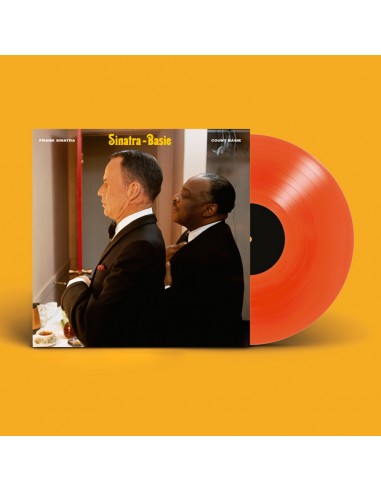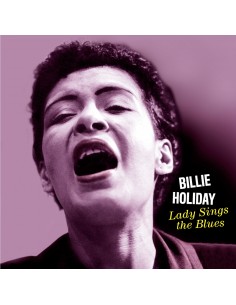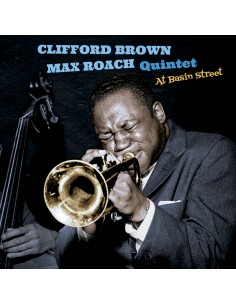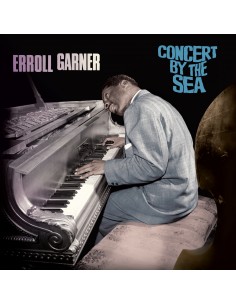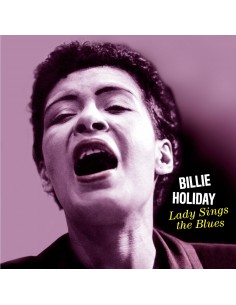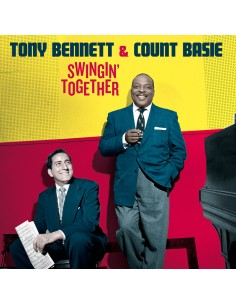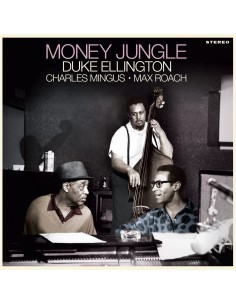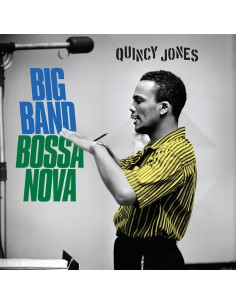Sinatra - Basie w/ Count Basie (Colored Vinyl)
Frank SinatraLIMITED EDITION
INCLUDES 2 BONUS TRACKS
CONTAINS NEW SPECIALLY PREPARED LINER NOTES BY PENGUIN GUIDE TO JAZZ’s WRITER BRIAN MORTON AND BY PARIS' PRESTIGIOUS JAZZ MAGAZINE
Sinatra had long since mastered the microphone, which had become his instrument, capable of a full-on roar or a whisper so intimate it seemed to be spoken inside the listener’s head. Tackling things like “Nice Work If You Can Get It” and “I Won’t Dance” took him back to a kind of repertoire he had mastered two decades before. The youthful sheen hadn’t quite left the voice and age hadn’t yet darkened it. Basie wasn’t the greatest sight-reader and may not have played on all the tracks, but his band knew the score and Sinatra-Basie remains a collaboration of great strength and naturalness. - Penguin Jazz to Jazz
The following decade would see his comeback to stardom, and Sinatra-Basie remains one of the highlights of that period. In this summit meeting, the iconic sonority of Basie’s orchestra is sublimated by Neal Hefti’s arrangements, while Sinatra, impeccable from start to finish, draws from the prodigious energy of the horns, strings and drums of this triumphant big band a simply irresistible elegance. Jazz Magazine
PERSONNEL:
Frank Sinatra - vocals
Count Basie - piano & conductor
THE COUNT BASIE ORCHESTRA :
Al Aarons, Sonny Cohn, Thad Jones, Al Porcino, Fortunatus “Fip” Ricard (tp), Henry Coker, Benny Powell, Rufus Wagner (tb), Marshal Royal (cl, as), Frank Wess (as, fl, ts), Eric Dixon (ts, fl), Frank Foster (ts), Charlie Fowlkes (bar), Freddie Green (g), Buddy Catlett (b), Sonny Payne (d).
Los Angeles, October 2 & 3, 1962.
(*) BONUS TRACKS (A6 & B6):
Frank Sinatra (vocals), orchestra conducted & arranged by Nelson Riddle
(Hollywood, January 10 (A6) & November 20 (B6), 1956.
TRACKS:
SIDE A:
A1 PENNIES FROM HEAVEN
A2 PLEASE BE KIND
A3 (LOVE IS) THE TENDER TRAP
A4 LOOKING AT THE WORLD THRU ROSE COLORED GLASSES
A5 MY KIND OF GIRL
A6 PENNIES FROM HEAVEN [1956 version] (*)
SIDE B:
B1 I ONLY HAVE EYES FOR YOU
B2 NICE WORK IF YOU CAN GET IT
B3 LEARNIN’ THE BLUES
B4 I’M GONNA SIT RIGHT DOWN AND WRITE MYSELF A LETTER
B5 I WON’T DANCE
B6 NICE WORK IF YOU CAN GET IT
[1956 version]
- Format
- LP
- Discs
- 1
- Label code
- 350230
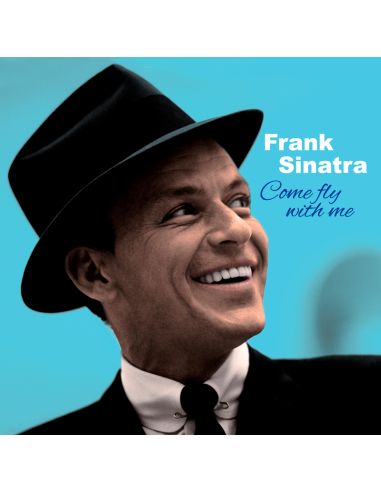
Frank Sinatra
Of all the American singers who left an immense musical legacy in popularity, Frank Sinatra is perhaps one of the most favored by critics and audiences alike.
With 3 stars on the Hollywood Walk of Fame, 209 appearances on music charts during the best period of his career, and an Oscar award for best supporting actor in the movie "From Here to Eternity", the singer of My Way undoubtedly occupies a privileged place among the best American musical references of all time.
Technically, Frank Sinatra is considered a pioneer in sound amplification, privileging the voice over the orchestra and managing to bring his vocalizations closer to the audience in an intimate way. He mastered his phrasing at will, with a register close to the bass baritone, and with an absolute ear, compared to great musicians such as Mozart, Freddie Mercury and Michael Jackson. Here is a brief overview of his brilliant musical career.
BIOGRAPHY
Francis Albert Sinatra was born on December 12, 1915 in New Jersey, and died of a myocardial infarction on May 14, 1998 in Los Angeles. He was born into a family of Italian immigrants and grew up in the midst of the activities of a midwife (his mother), and that of a boxer, fireman and tavern owner (his father).
His musical beginnings, full of stumbles and abandonments, were initiated by a strong admiration for the personality of Bing Crosby, and by the occasional song he played in his father's tavern. It was after attending a Carlos Gardel event, when his wife, after the show, approached Gardel and told him about Sinatra. She said he was a good singer, but he was hanging out with the wrong crowd. Gardel talked to young Frank and told him to give up the life he was leading to devote himself to music by participating in the "Major Bowes Amateur Hour'" contest.
Sinatra not only listened to Gardel, but participated in the contest with the trio "Three Flashes", winning first prize and going on tour in a series of concerts sponsored by the contest. This meant for Frank Sinatra an important leap in his musical career. First he sang with Harry Arden, then he got on the radar of Harry James, Benny Goodman's trumpet player, until he ended up as a vocalist for Tommy Dorsey himself.
From this moment on, Sinatra's success did not stop: Billboard magazine awarded him the first place in 1940 with the song "I'll never smile again", accompanied by Dorsey. Some time later, he became a social phenomenon and idol of the American youth, singing at the Paramount Theater, where the guest star was Benny Goodman. Sinatra had a brilliant musical career and on the best stages, but he also struggled for three things that accompanied that career: film acting, support for the Democratic Party and a convulsive and quite criticized personal life, where Frank Sinatra is related to the Mafia.
MUSICAL INFLUENCES
Given the nature of the social impact he produced, Frank Sinatra's influence transcends the music scene. Not only did he become a character in American popular culture, but he also influenced his audience through his voice, character, personality, and his relationships with political and ideological sectors, in addition to belonging to the imaginary of the common people. Sinatra leaves an almost mythological legacy with his 1300 recordings, his participation in more than 50 films, and above all for the way he created to differentiate himself from the artists of the moment: Louis Armstrong, Benny Goodman, Bing Crosby and Fred Astaire.
COLLABORATORS IN PERFORMANCE
To name the collaborations Sinatra had is almost unthinkable. However, among the most important are the following: Harry James, Tommy Dorsey, Axel Stordahl, Sy Oliver, Paul Weston, Count Basie, Duke Ellington and Antonio Carlos Jobim. Other highlights include Bing Crosby, Antonio Carlos Jobim, Duke Ellington, Barbra Streisand, Count Basie, Luciano Pavaroti, Aretha Franklin, and his own daughter Nancy Sinatra.
DISCOGRAPHY
His recordings were innumerable: more than 1300 songs. To mention them one by one would be extensive, however, we leave here a top of his most emblematic records that every person should listen to, and that every collector should have. Discover them!
Frank Sinatra Christmas Song (1948)
In the wee small hours (1955)
Songs for swingin' lovers (1956)
Come fly with me (1958)
Come dance with me (1959)
Come swing with me (1961)
Sinatra-Basie w/Count Basie (Colored Vinyl) (1962)
Strangers in the night (1966)
Francis Albert Sinatra & Antonio Carlos Jobim (1967)
The Reprise years (1991)
Duets (1993)
Sinatra 80th. All the best (1995)
MOST FAMOUS SONG
Among the gigantic repertoire of songs, there is no doubt that Sinatra has numerous hits and singles considered classics in the history of 20th century music. We can mention, for example: "My Way", "I did it my way" and "I've Got You Under My Skin'', the latter considered a masterpiece and one of the singer's favorites.
Also included are, without a doubt, "The best is yet to come" and the indisputable "It Was A Very Good Year''. Other songs such as "Come Fly with Me'', "The Way You Look Tonight" or "Strangers in the Night", marked an era and produced a musical influence on several generations.
FRANK SINATRA: AN ICON ALREADY IMMORTALIZED
Sinatra (2011) is a film directed by Brett Ratner and produced by New Line. Like this film, there have been numerous films that have contributed to elevate his legend, highlighting his life and work, the historical moment in which his music was produced, and his main collaborators.
Michael Francis Sinatra and Natalie Oglesby Skalla, are also part of those who, from within the family, collaborated to continue the myth of the music mogul Frank Sinatra. Other artists, politicians like Kennedy and Reagan, but also actresses like Eva Gadner and Marilyn Monroe, also contributed to the popularity of an artist whose voice, personality and power, continues to be one of the greatest exponents of the American male song.
We invite you to continue enjoying the best music at Jazz Images Records.
 Cookie preferences
Cookie preferences



